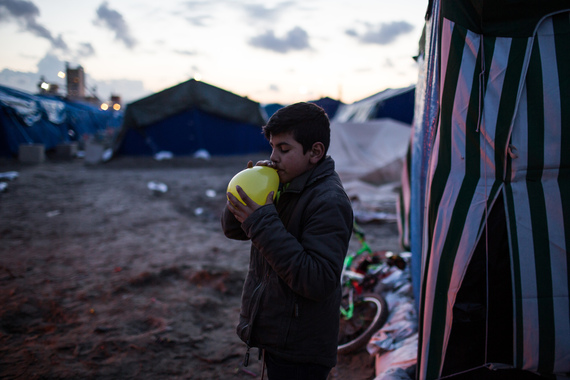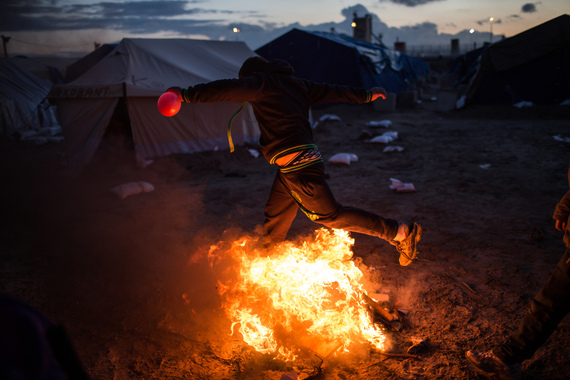This time last year the notorious ‘jungle’ refugee camp in Calais was bull-dozed and its thousands of inhabitants dispersed. For the refugee and migrant children in the squalid camp that should have been the end of an inhumane experience, but for some, it only spelled greater uncertainty. At the time of its demolition, the “jungle” hosted almost ten thousand migrants and refugees, including up to 1,000 unaccompanied children. Hundreds of them had family ties in the UK and were intent on reaching brothers, sisters, uncles and aunts. Others were without family, and were acutely vulnerable, having suffered the horrors and indignities of conflict and people smuggling. The UK Home Secretary, Amber Rudd, then displayed extraordinary political courage and will, by agreeing to bring 750 children from Calais to the UK, to be reunited with families, or offered social protection. They were the lucky ones. A significant number were driven away from the burning camp before having the opportunity to make themselves known. Still others were not offered the same help, and remained in shipping containers with scarce access to food, water and legal assistance.
Today, hundreds of children remain scattered in and around Calais, desperately trying to survive with no access to shelter or basic services. Many will have been pushed into the hands of traffickers and smugglers just to stay alive. A year on from the destruction of the ‘jungle’ it is time to get to the heart of this problem, to find lasting solutions to bring children to the safety of loves ones in the UK where it is clearly in their best interest for us to do so. We cannot tolerate a repeat of the same situation, and must therefore find ways to prevent children making these dangerous journeys to Europe in the first place.
A simple change to the UK’s Immigration Rules could ensure children with close family in the UK have no reason to turn to people smugglers or risk being trafficked at all. Where a child knows they have a relative in the UK who can provide the love and protection they need, they should be able to make an application for family reunion at a British consulate or outpost in their country of origin.
Right now, children fleeing danger have a right to request family reunion in the UK if they have a parent here already. But when they don’t have parents able to safely protect them, children need instead to be looked after by wider family – adult siblings, aunts, uncles, grandparents. At the moment, their only hope of achieving this is to try to make it to Europe and apply to have their asylum case transferred to the country that this family member lives in. When the hope of being with another member of family in the UK is the only hope they have, a child shouldn’t have to first face unthinkable risks to get to Europe from where they are.
In recent weeks, as the European Union (Withdrawal) Bill makes its way through Parliament, a flagship amendment has been tabled to the Bill which would address this flaw in the UK’s law, allowing children to apply for reunification with relatives, not just parents, from their region of origin. It has been backed by politicians across the political spectrum, but we need momentum sustained to increase our chances of making this critical change for children.
In the meantime the situation for unaccompanied children in France remains bleak but immediate action by both the UK and France can be their lifeline. We should start by asking difficult questions about why the situation has worsened, with countless child refugees and migrants living in forests and woods without shelter or the most basic levels of protection. Children are left with no clear information on the legal processes they need to undertake to reach family members in the UK. Too many receive confusing and conflicting messages from officials, pushing them to give up on legal processes that simply do not seem to work, instead taking things into their own hands. This sees them disappearing, untraceable, and therefore beyond protection, driven underground where they are treated by criminal gangs as perfect prey.
A first step in urgently addressing their plight is ensuring there is enough safe and official accommodation for children stranded around France and giving them access to basic services that they have been without. In the care of authorities children can begin the legal process for reaching families without falling through the cracks of a broken system, but this requires adequate, consistent and clear provision of legal advice that meets children where they are rather than pushing them away. To help them through this process, children need to be provided with guardians and those still unaccompanied need to be identified by ramping up the presence of mobile teams in informal camps. This must happen without delay.
Calais stands as a stark reminder of just how vulnerable these children are, torn from their homes because their lives became filled with bullets, bombs and bloodshed. Another day of inaction is one too many, and carries with it a heavy price on children’s lives. In cooperation with the French government, the UK must take immediate steps to address the situation that was left behind last year. And crucially we can ensure that the UK uses Brexit to show the world that it will not turn its back on those in need, but uphold our reputation as a compassionate, global Britain. Play your part and sign Unicef UK’s petition calling on MPs to do just this – every sign up is a step towards protecting vulnerable children all over the world.

